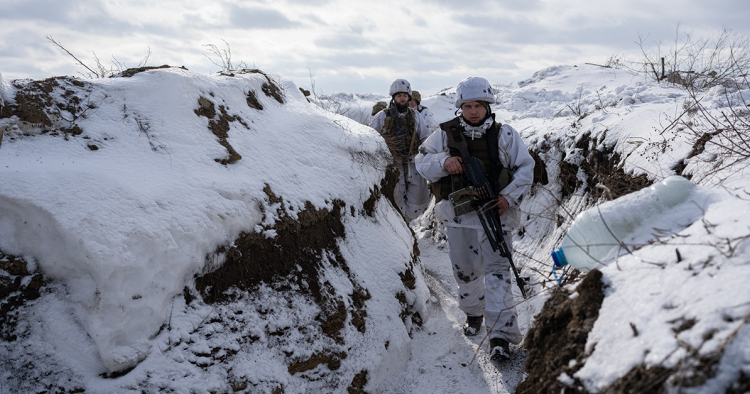The Russian Federation’s invasion of Ukraine shocked and surprised the international community, particularly other European countries. The ongoing war will certainly affect the global balance of power while leading the European Union (EU) and its members states to reevaluate the means and ends of their foreign policy. While most analyses have tended to focus on the intra-European dimension, it is worth exploring the potential consequences of this conflict for the EU’s relations with countries further afield, especially those in the Middle East and North Africa (MENA).
The war has galvanized efforts within the EU to limit imports of Russian hydrocarbons and thus has brought home to European leaders the importance of reviving the 2015 nuclear deal with Iran. In light of growing Euro-Russian antagonism, European states are looking to end their reliance on Russian oil and gas imports, setting a deadline of 2027 for doing so, and Iranian energy supplies could be part of the solution. Currently, this applies to crude oil and it might eventually encompass natural gas as well. Thus, Europeans care more than ever about the success of the Vienna talks and the revival of the nuclear deal, as Iranian energy may be a key element of plans to wean the continent off of Russian fossil fuels, alongside new supplies from the U.S., the Gulf, and elsewhere.
The conflict in Ukraine has once again proved Turkey’s geopolitical clout. Much depends and will depend on Ankara’s actions going forward. For now, Turkey is trying to maintain a balancing act between Ukraine and Russia and play the role of mediator. If such mediation proves effective, it would further enhance Turkey’s strategic importance for Brussels at a time when the broader regional security framework is in flux. Moreover, as the EU and NATO look to shore up their defenses against any future Russian aggression in the Mediterranean and Black seas, with NATO deploying new battlegroups in Bulgaria and Romania (as well as Hungary and Slovakia), Turkey could play an increasingly central role. It could also serve as an overland connection to Georgia, which has formally applied to join the EU and has serious security concerns of its own regarding Russian aspirations. While there are major question marks over the future of regional security, EU-Turkey ties are only likely to become more important moving forward.
European decision-makers will also need to pay particular attention to the increasingly close ties between some Arab states, especially those in the Gulf, and Russia. This is a longer-term trend, but it has been thrown into sharp relief since the outbreak of the war. While leading Gulf energy suppliers like the UAE, Saudi Arabia, and Qatar voted in favor of the U.N. General Assembly resolution condemning the Russian invasion on March 2, given their growing concerns over the reliability of U.S. security guarantees and the hedging strategies they have adopted as a result, they would not benefit from a weaker Russia. Saudi Arabia and the UAE are also keen not to upset the balance within OPEC+, of which Russia is a key member, especially at a time when relations with the Biden administration are so strained. All of this will complicate matters for Europe, especially for officials looking to Gulf oil and gas producers to replace Russian supplies.
Convincing Israel to toe the Western line on Russia will present a major challenge as well. Israel’s refusal to cut ties with Russia and to implement sanctions has been and will continue to be a source of tensions in its relations with the EU. If Israel tolerates further attempts by Kremlin-linked Russian oligarchs to bypass individual sanctions, its relations with most European countries will suffer. Moreover, if an agreement is reached in Vienna and European states resume large-scale trade with Iran, Israel might be willing to take action against the Islamic Republic, either unilaterally or in coordination with Russia, which retains a strong influence over the government in Tehran. In either case, Israel would have to offer the Russians a lot to turn a blind eye to an attack on Iranian nuclear installations, for example.
In sum, the war in Ukraine is likely to affect the EU’s political and economic ties with the countries of the MENA region. EU leaders should pay close attention to the positions and declarations of these countries as they will determine Europe’s room to maneuver in coordinating policy with them. Otherwise, measures against Russia, such as the imposition of sanctions, could founder on a lack of buy-in from MENA states. There remains an important challenge in trying to convince some Middle Eastern leaders that they would profit more from supporting Western sanctions than from maintaining friendly relations with Moscow. Getting Gulf countries on board will be crucial if Europe hopes to fill the gap that a boycott of Russian fossil fuels would leave in the European energy market. For this reason, as they seek to further ramp up pressure on Moscow, EU diplomats should extend their activities beyond the U.S. and the governments of individual European states to include countries in Russia’s own geopolitical neighborhood.
Przemysław Osiewicz is a non-resident scholar at MEI and an associate professor at Adam Mickiewicz University in Poznan, Poland, specializing in EU policy towards the MENA region, Iran, and Turkey. The views expressed in this article are his own.
Photo by Stringer/Anadolu Agency via Getty Images
The Middle East Institute (MEI) is an independent, non-partisan, non-for-profit, educational organization. It does not engage in advocacy and its scholars’ opinions are their own. MEI welcomes financial donations, but retains sole editorial control over its work and its publications reflect only the authors’ views. For a listing of MEI donors, please click here.













